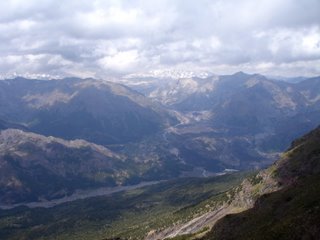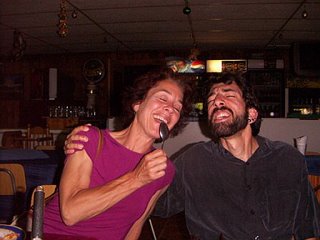 Yesterday Dan and I hiked to Enladrillado, loosely translated as “brick paving”, a plateau in the Andes that overlooks the Claro gorge. The name is attributed to the layout of stones on this high plain: gigantic hexagonal stones that appear to be tiled by a mysterious landscape artist in the sky at an altitude of 7,160 feet. Among locals it has a reputation for being a UFO landing strip. Even the Chile Corporacion Nacional Forestal (CONAF) map refers to the popular interpretation of the site as designed and visited by extraterrestrials. This has been a destination since we knew we were coming to Chile and we read about it in guide books…not because of the woo woo factor, but because it’s considered to be the most beautiful hike between Santiago and Temuco—our home territory here.
Yesterday Dan and I hiked to Enladrillado, loosely translated as “brick paving”, a plateau in the Andes that overlooks the Claro gorge. The name is attributed to the layout of stones on this high plain: gigantic hexagonal stones that appear to be tiled by a mysterious landscape artist in the sky at an altitude of 7,160 feet. Among locals it has a reputation for being a UFO landing strip. Even the Chile Corporacion Nacional Forestal (CONAF) map refers to the popular interpretation of the site as designed and visited by extraterrestrials. This has been a destination since we knew we were coming to Chile and we read about it in guide books…not because of the woo woo factor, but because it’s considered to be the most beautiful hike between Santiago and Temuco—our home territory here. After four hours of steadfast hiking and climbing we reached Enladrillado and noticed one other friendly person who paused for a warm welcome before resuming his gesturing to two other companions off in the distance. We sat on a large flat rock perched on the precipice of the Rio Claro valley far, far below and took in the breathtaking views of the mountain peaks and the valley landscape while eating our lunch. “Blissed out” best describes our state of mind. Eventually, after consuming every last morsel of our food while absorbing the vast vistas, I noticed a new buzzing sound. I turned to see the trio sitting in a tight circle, chanting in unison. We were delighted that they were not intimated by our presence and could readily launch into such exuberant harmony. We listened to their rising and falling cadences and wondered about their invocations. Eventually though, they were forgotten as we retreated into our own wondrous world.
After four hours of steadfast hiking and climbing we reached Enladrillado and noticed one other friendly person who paused for a warm welcome before resuming his gesturing to two other companions off in the distance. We sat on a large flat rock perched on the precipice of the Rio Claro valley far, far below and took in the breathtaking views of the mountain peaks and the valley landscape while eating our lunch. “Blissed out” best describes our state of mind. Eventually, after consuming every last morsel of our food while absorbing the vast vistas, I noticed a new buzzing sound. I turned to see the trio sitting in a tight circle, chanting in unison. We were delighted that they were not intimated by our presence and could readily launch into such exuberant harmony. We listened to their rising and falling cadences and wondered about their invocations. Eventually though, they were forgotten as we retreated into our own wondrous world. Just as our fingers were getting numb and we thought we should start moving again, a magnificent condor appeared to the east and gracefully glided above us. Dan hustled to take a photo but that meant taking his eyes off this majestic bird with a wingspan of 10 feet. It was, in a word, magical. As it faded into the western sky, our friends, finished with their meditation, were whooping with joy at the condor sighting. They came over to tell us that there were only 50 condors in Chile and it was very special to see one. We have no doubt about the latter—it was more than special, it was spectacular. After a few moments of celebration and then a photo-op for Dan and me, they were off.
Just as our fingers were getting numb and we thought we should start moving again, a magnificent condor appeared to the east and gracefully glided above us. Dan hustled to take a photo but that meant taking his eyes off this majestic bird with a wingspan of 10 feet. It was, in a word, magical. As it faded into the western sky, our friends, finished with their meditation, were whooping with joy at the condor sighting. They came over to tell us that there were only 50 condors in Chile and it was very special to see one. We have no doubt about the latter—it was more than special, it was spectacular. After a few moments of celebration and then a photo-op for Dan and me, they were off. In time we began to gather ourselves to resume the walk back down to the Rio Lircay valley floor. After lingering for our last long look, we turned to go back. Within minutes Dan shouted an alarm behind me and I swung around to see that the condor was back. This time he was determined to capture its grandeur in a photo because our memories often fail us in the long run. The condor mesmerized us with its presence and kept us a captive audience for a while longer. All good things come to an end however, and ultimately we had to bid farewell to the King of the Andes as it disappeared from where it came in the eastern horizon. We’re unanimous on this: a visitation from aliens is not required to make this trek worthy of its high rating; on the other hand, a visitation from a condor elevates it to the sublime.
In time we began to gather ourselves to resume the walk back down to the Rio Lircay valley floor. After lingering for our last long look, we turned to go back. Within minutes Dan shouted an alarm behind me and I swung around to see that the condor was back. This time he was determined to capture its grandeur in a photo because our memories often fail us in the long run. The condor mesmerized us with its presence and kept us a captive audience for a while longer. All good things come to an end however, and ultimately we had to bid farewell to the King of the Andes as it disappeared from where it came in the eastern horizon. We’re unanimous on this: a visitation from aliens is not required to make this trek worthy of its high rating; on the other hand, a visitation from a condor elevates it to the sublime.For more pictures from the hike, go to this link




